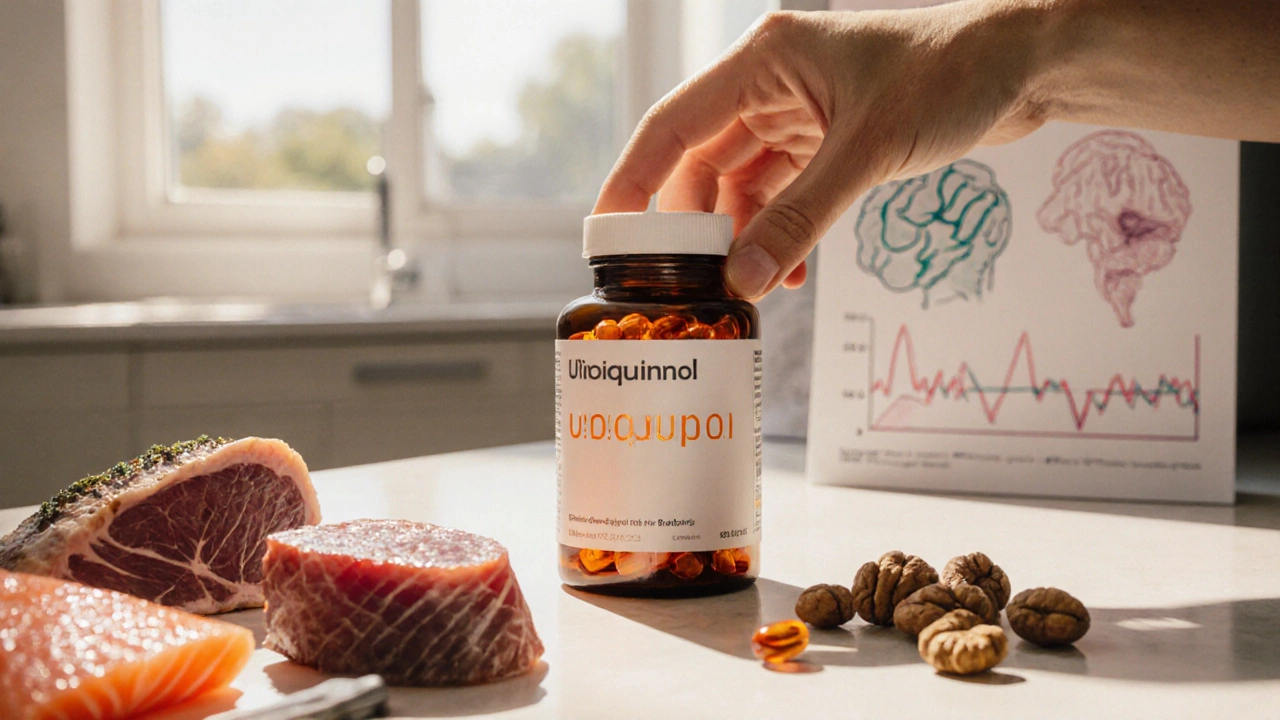CoQ10 Dosage Calculator
Recommended Dosage
About CoQ10
Coenzyme Q10 (CoQ10) is a fat-soluble antioxidant that plays a crucial role in cellular energy production and acts as a powerful protector against oxidative stress.
Coenzyme Q10 (CoQ10 is a fat‑soluble antioxidant that drives cellular energy production) has been buzzing in health circles for years, but many still wonder what it actually does for the body. If you’ve heard about it in a gym, a doctor’s office, or a beauty blog, you’re probably curious about the real‑world benefits, the right way to take it, and whether it’s safe for you. This guide breaks down the science, the practical uses, and the everyday questions so you can decide if adding CoQ10 to your routine makes sense.
Key Takeaways
- CoQ10 supports heart health, brain function, and skin vitality by improving mitochondrial energy and acting as a potent antioxidant.
- Two main supplement forms exist: ubiquinone (oxidized) and ubiquinol (reduced); ubiquinol is more bioavailable, especially for older adults.
- Typical daily doses range from 100mg to 300mg, but higher amounts may be needed when you’re on statin medication.
- Side effects are rare; mild stomach upset is the most common, and interactions are limited to certain blood‑thinners and thyroid drugs.
- Natural food sources (fatty fish, organ meats, nuts) contain modest amounts, so supplements are often used to reach therapeutic levels.
How CoQ10 Works Inside Your Body
Every cell in your body contains mitochondria the power plants that convert nutrients into ATP (cellular energy). CoQ10 sits in the inner membrane of these organelles, shuttling electrons during the production of ATP. Think of it as a courier that hands off energy packets, keeping the factory running smoothly. Without enough CoQ10, the efficiency drops, leading to fatigue and reduced organ performance.
Besides its role in energy, CoQ10 is a strong antioxidant a molecule that neutralizes free radicals and protects cells from oxidative damage. Oxidative stress is linked to aging, inflammation, and chronic diseases, so keeping antioxidant levels high can help maintain overall health.
Primary Health Benefits of CoQ10
Below are the most researched areas where CoQ10 shows measurable impact.
- Heart health: Studies show that supplementing 100-200mg daily can improve left‑ventricular ejection fraction and lower blood pressure in people with congestive heart failure.
- Brain and nerve support: CoQ10 crosses the blood‑brain barrier and may slow cognitive decline in early Alzheimer’s and Parkinson’s disease patients.
- Skin vitality: As a skin health CoQ10 reduces the appearance of fine lines by protecting collagen from oxidative breakdown when applied topically or taken orally.
- Exercise performance: Athletes taking 200mg before training report higher VO2 max and less perceived fatigue.
- Statin‑induced muscle pain: Statins lower the body’s natural CoQ10 levels, leading to myalgia; supplementing can alleviate these symptoms for many users.

Ubiquinone vs. Ubiquinol: Which Form Should You Choose?
CoQ10 comes in two chemical states. Ubiquinone the oxidized form typically found in standard supplements must be converted to ubiquinol in the body before it becomes active. Ubiquinol the reduced, ready‑to‑use form offering higher absorption rates is especially beneficial for people over 40, those with digestive issues, or anyone on high‑dose statins.
| Attribute | Ubiquinone | Ubiquinol |
|---|---|---|
| Absorption rate | ~50‑60% | ~80‑90% |
| Stability | More stable in heat | Sensitive to light and heat |
| Best for | General adult use | Older adults, statin users, athletes |
| Typical dose | 100‑200mg | 100‑200mg (often lower due to higher bioavailability) |
How Much Should You Take? (Dosage Guidelines)
There isn’t a one‑size‑fits‑all answer, but research gives us solid ranges.
- General wellness: 100mg once daily is enough for antioxidant support.
- Heart conditions: 200‑300mg split into two doses has shown improvements in cardiac output.
- Statin users: 200mg daily often restores depleted levels and eases muscle aches.
- Skin care: 100mg plus a topical cream containing 0.5% CoQ10 for visible anti‑aging benefits.
Take CoQ10 with a meal that contains fat, as its absorption is fat‑dependent. If you’re unsure, start with 100mg for a week, monitor how you feel, then adjust.
Safety Profile and Possible Side Effects
CoQ10 is generally well‑tolerated. Clinical trials involving thousands of participants report fewer than 5% experiencing mild gastrointestinal issues such as nausea or diarrhea. Rarely, people may notice a headache or insomnia, especially at doses above 400mg.
Interactions are limited but worth noting:
- Statins cholesterol‑lowering drugs that also lower CoQ10 levels - CoQ10 can counteract muscle pain.
- Warfarin (blood thinner) - high doses of CoQ10 may enhance its effect; monitoring INR is advised.
- Thyroid medication - occasional adjustments may be needed because CoQ10 can influence metabolic rate.
Pregnant or nursing women should consult a doctor before starting any supplement.

Food Sources vs. Supplements
Getting CoQ10 from diet alone is tough. Average daily intake from food is 3‑6mg, far below therapeutic levels.
- Fatty fish (salmon, mackerel): 2‑4mg per 100g.
- Organ meats (beef heart, liver): up to 10mg per 100g.
- Nuts and seeds (peanuts, sesame): 0.5‑1mg per ounce.
Because the gap is large, most people rely on supplements to reach the 100‑300mg range needed for health benefits.
Who Might Benefit Most From CoQ10?
While anyone can try CoQ10, certain groups see clearer advantages.
- Middle‑aged and older adults: Natural production drops by about 2‑3% each year after age 30.
- People on statin therapy: Counteracts drug‑induced depletion.
- Athletes and fitness enthusiasts: Boosts ATP, helping sustain high‑intensity workouts.
- Individuals with chronic heart conditions: Improves heart muscle efficiency.
- Those concerned with skin aging: Provides antioxidant protection to collagen.
Practical Tips for Choosing a Quality CoQ10 Supplement
- Look for third‑party testing (USP, NSF) to ensure label accuracy.
- Prefer soft‑gel capsules; oil‑based formulations aid absorption.
- Check the form - ubiquinol for older adults or high‑dosage needs.
- Pay attention to expiration dates; CoQ10 degrades over time.
- If possible, choose products that include a small amount of omega‑3 or vitaminE, which further stabilizes the molecule.
Frequently Asked Questions
What does CoQ10 actually do in the body?
CoQ10 transports electrons inside mitochondria, helping generate ATP - the energy currency of cells - and also acts as an antioxidant that protects cells from damage caused by free radicals.
Can I get enough CoQ10 from food alone?
Typical diets provide only 3‑6mg per day, far below the 100‑300mg range often used for therapeutic benefits. Most people need a supplement to reach effective doses.
Is ubiquinol really better than ubiquinone?
Ubiquinol is the reduced, more bioavailable form. It’s especially advantageous for people over 40, those with digestive issues, or anyone taking high‑dose statins. Younger, healthy adults can use ubiquinone with good results.
Will CoQ10 interact with my blood‑thinner medication?
High doses may enhance the effect of warfarin, increasing bleeding risk. If you’re on a blood thinner, talk to your doctor and monitor INR levels after starting CoQ10.
How long does it take to notice benefits?
Most people report improved energy and reduced muscle soreness within 2‑4 weeks. Heart‑specific outcomes may take 8‑12 weeks of consistent dosing.
Bottom line: if you’re looking for a supplement that backs up heart health, boosts cellular energy, and offers antioxidant protection, the CoQ10 benefits are hard to ignore. Start with a reputable ubiquinol product, keep the dose moderate, and monitor how you feel. As always, a quick chat with your healthcare provider can tailor the plan to your unique needs.





